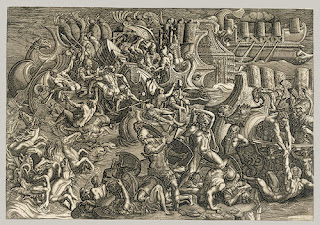Homer's Iliad and Junger's Valley of the Shadow of Death are both poignant accounts of war. One thing that struck me about both stories was the description of the psychological impact of battle. There are descriptions of gruesome deaths and injuries, more in the Iliad than the Valley of the Shadow of Death. Like the constant descriptions of blood pooling and dogs eating dead bodies. But war wound descriptions are still present in both. There is the same concern and horror with the soldiers for the wounded in the Iliad as there is with the American troops. It shows the fear for the other soldiers; in the Iliad with Patroclus fighting in order to save the men's lives and in Junger's work with Guttie's fall and the fear that he would die. Another thing that is showcased very clearly in both texts is the fear environment that is all around them. The American soldiers are attacked every day, and there is always the fear that they will be breached and anhilated. The same is in the Iliad; the Greek soldiers are terrified that the Trojans will eventually breach their camps and they will all be destroyed.
In my opinion, however, I think Junger's work shows more terror and far less glorification of war than the Iliad. The American soldiers don't look for glory when they decide to join the army like many of the Greeks do. There are no trophies of war, or ceremonial celebrations of victory in Afghanistan. however, the Iliad is not completely pro war. Though there is certainly a hunt for glory that is no longer current in today's world, Homer makes sure to show us the glory and the horror of war in his various praising epithets and his depressing descriptions of death.

No comments:
Post a Comment